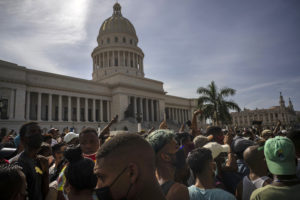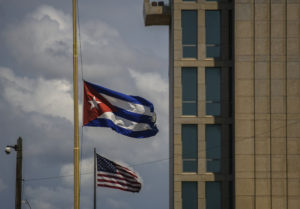Hours after Vice President Joe Biden welcomed famed Cuban blogger and social media political activist Yoani Sánchez for a high profile photo op and meeting, the Associated Press broke a story about a clandestine U.S. Agency for International Development (USAID) program that reportedly stole thousands of phone numbers of Cuban cellphone users in an elaborate attempt to inspire social unrest in Cuba.
According to the AP, in 2010 the USAID Office of Transition Initiatives and contractor Creative Associates secretly created a Twitter-like cell phone platform that allowed U.S. information technology contractors to gather private data on its 40,000 Cuban users and blast out text messages to the subscribers. The platform, called ZunZuneo, also allowed Cubans to communicate via text message with people who subscribed to their feed.
While the platform was popular among its Cuban users, Creative Associates was unable to find a way to make it financially sustainable, and ZunZuneo abruptly disappeared when its government funding dried up in September 2012. In the end, similar to other USAID initiatives that are described as “promoting democracy” but seem aimed at making trouble for the Cuban government, ZunZuneo was a costly failure that wasted millions of dollars, and it will likely undermine genuine internal reform efforts in Cuba and further damage the U.S. government’s reputation in the region. The program is another ugly reminder of how an insular group of well-positioned politicians from Florida and New Jersey have long protected wasteful USAID programs that damage broader U.S. national interests.
While the AP story has rightly captured a great deal of attention for exposing such a controversial approach to reaching Cubans, it did not even mention another lightning rod issue associated with USAID’s misguided Cuba programs: the existence of cozy contractor relationships with high-level government officials.
In 2005, Caleb McCarry was named Cuba Transition Coordinator, a controversial new position within the Bush administration’s State Department that was established to “accelerate the demise of Castro’s tyranny,” according to then-Secretary of State Condoleezza Rice. In more practical terms, McCarry was hired to allocate millions of dollars in U.S. funding to Cuban dissidents and groups in the United States that supported them. McCarry’s position was created in spite of the fact that many Cuban dissidents objected to the existence of a “Cuba Transition Coordinator” and pointed out that U.S. government funding would allow the Cuban government to accuse dissidents of being foreign mercenaries.
In 2006, the Government Accountability Office released a report noting that most of the US$74 million spent to date promoting democracy in Cuba were not subject to competitive bids or sound oversight. In short, U.S. programs to challenge the Cuban government were fraught with waste and fraud.
USAID’s programs continued nonetheless. In 2008, Creative Associates won a $6.5 million contract to promote democracy in Cuba, even though it had no experience working in the country. Immediately after Creative Associates won the Cuba contract, McCarry left the State Department and got on the other side of the Cuba money by joining Creative Associates. Two years later, Creative Associates reportedly pursued an additional $2.5 million in Cuba money. Only now, six years after USAID hired Creative Associates to promote democracy in Cuba, we are learning about the program’s woeful record.
Worse yet, USAID’s surreptitious Cuba programming has incurred high human costs as well. At the same time that Creative Associates was contracted by USAID, Development Alternatives Incorporated (DAI) also won a piece of the U.S. money dedicated to democratize Cuba.
In 2009, DAI employee Alan Gross was arrested in Cuba for delivering satellite Internet equipment to the Jewish community in Cuba while lying on official Cuban documents about his reasons for visiting the country. According to a former USAID lawyer, U.S. government officials must have known with certainty that Gross, who had no experience conducting semi-covert operations, would be arrested. In 2010, Gross was sentenced to 15 years in prison and repeated U.S. government calls for his unconditional release have been unsuccessful.
In a recent article, Bloomberg View columnist Jeff Goldberg noted that Gross was, “in essence, abandoned by the government that sent him to Cuba.” While this lack of action is disturbing on its own, it seems even more egregious when one considers that ZunZuneo—an incredibly ill-conceived program—seems to have been activated after Gross was arrested. The U.S. government did not merely abandon Gross; it continued to carry on risky activities that, if discovered, would be sure to provoke the ire of the Cuban government, thus potentially further jeopardizing the well-being of Gross.
Since Gross’s arrest, politicians who are both stalwart supporters of the embargo and aggressive advocates for continued USAID democracy programming in Cuba have used his imprisonment to argue against improvements in U.S.-Cuba relations. Continuing to apply pressure on the Obama administration not to negotiate with the Cubans to win the release of Alan Gross, a group of senators, including Cuban-American Senators Robert Menéndez and Marco Rubio sent a letter to the president demanding an unconditional release. Tellingly, Menendez and Rubio did not sign the letter by 66 other senators that called on the Obama administration to do everything in its power to bring Gross home, since such a message could imply negotiations with the Cuban government.
In the end, counterproductive USAID programming such as Creative Associates’ wasteful social media project not only fail to achieve their objectives; they also serve to maintain heightened levels of conflict between the U.S. and Cuban governments.
The objective of current U.S. policy toward Cuba is supposedly to help the Cuban people exercise their fundamental human rights and enjoy greater economic opportunities. Those ends would be much better served by ending the embargo on Cuba.
Contact:
Ana Goerdt
WOLA Program Officer
Office (202) 797-2171; cell 952-210-9911
agoerdt@wola.org


